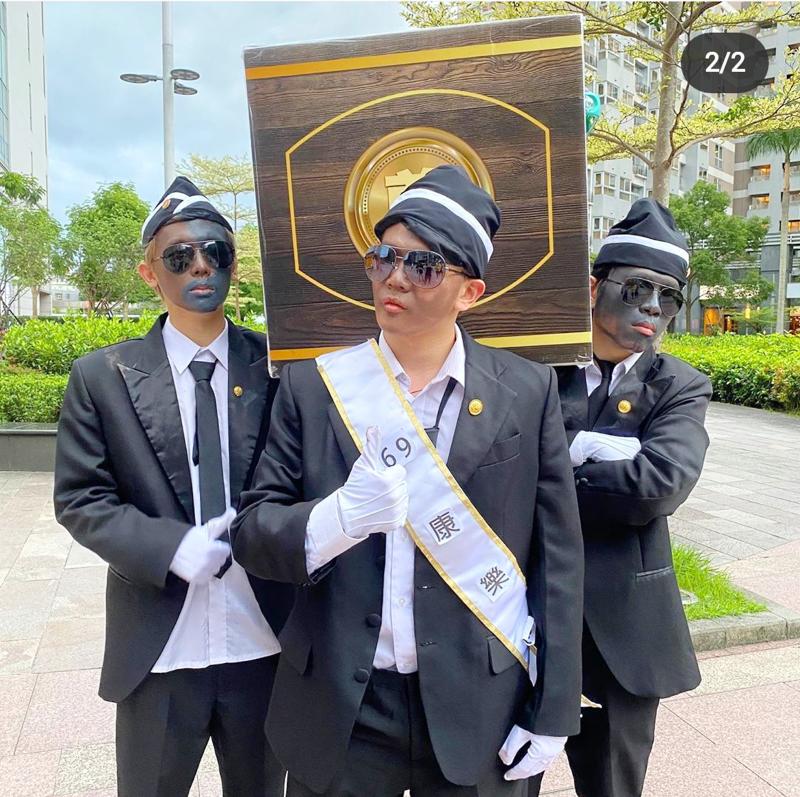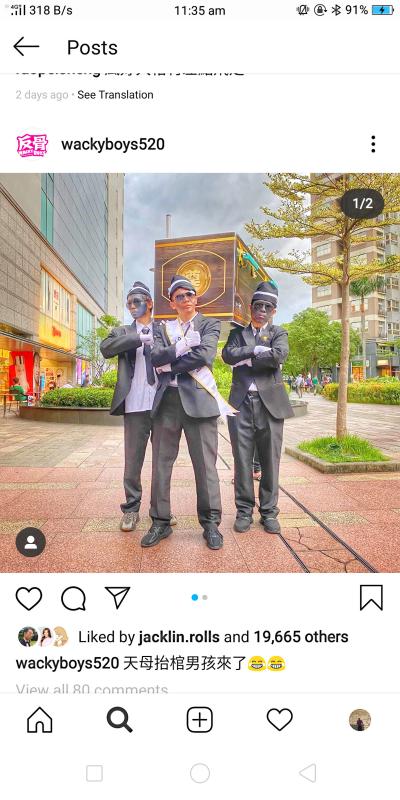African-American entertainer Dooley appeared on local television show Super Entourage (小明星大跟班) a few weeks ago and was told by the crew that they wanted to do a skit in blackface.
Dooley, whose real name is Matthew Candler, tells the Taipei Times that Super Entourage wanted to perform a rendition of the wildly popular “Ghana Coffin Dance,” a meme that has taken the world by storm. Instead, he showed them videos about the racist origins of blackface and slavery in America, and they agreed to drop the makeup.
“[I told them] about the history [behind blackface] and [said] you decide whether you want to do it.”

Photo: Screenshot
Although the crew decided not to do the skit, other Taiwanese groups have drawn fire for performing it in blackface.
At a time when protests against police brutality toward African-Americans rocks the US, YouTubers Wackyboys (反骨男孩), who have over 1.4 million subscribers and over 700,000 Facebook followers, uploaded photos and a video of the Ghana Coffin Dance in blackface this past weekend. The group deleted the performance on Tuesday following criticism from netizens.
This follows popular dance group Luxy Boyz’ performance of the same dance in blackface last month at popular night club Omni. After complaints, the club and crew removed the videos and refrained from wearing blackface in subsequent acts. Although the incident was picked up by a few English-language media outlets, the Chinese-language media seems to have completely ignored the issue — a stark contrast from the commotion when Hsinchu high school students staged a Nazi-themed parade in 2016.

Photo: Screenshot
The only Chinese content that specifically addressed the issue was a video on Dooley’s YouTube channel uploaded on May 9, which had 2,899 views as of press time yesterday. Dooley, who has lived in Taiwan for 17 years, believes that Taiwanese aren’t being intentionally racist, they just don’t know the violent history of African-Americans.
“Everyone, no matter where you go in this world, understands what happened in Nazi Germany,” he tells the Taipei Times, but few understand the violent history that underscores blackface.
“This came about after the end of slavery when white actors would dress up as black people and paint their faces black with big eyes and huge red lips. They would dance around and make a mockery of the slaves and their culture. They used this as a way to really degrade black people.”
Wackyboys could not be reached for comment, and they have yet to post anything regarding the video on their social media platforms after deleting the content. A few netizens have continued to call for them to apologize by posting comments to other photos on Instagram.
“You owe the African community a public apology, not just by deleting your shameful actions,” commented eileendoesart.
The Luxy Boyz incident was handled similarly, with no explanation or apology to be found on their social media. They continue to promote the “non-blackface” version of their act.
Omni issued an apology, claiming ignorance to English-language media, but it cannot be found in Chinese.
While the comments section on the actual video was full of angry accusations of racism after it went viral, few people condemned the preview photos on WackyBoys’ Facebook page before the video surfaced. Out of 75 comments posted before the photos were removed, only a handful mentioned that it was racist. The rest were complimentary.
There are some recent Chinese-language reports explaining the history of blackface and why it is considered racist. But they are all in response to incidents in other countries, such as when Canadian Prime Minister Justin Trudeau apologized last year after pictures surfaced of him wearing brownface as a young man at a party.
An Apple Daily report from September last year, citing the 2018 controversy over a Chinese performer wearing blackface during the Lunar New Year gala on China Network Television, said that although the racism explicit in wearing blackface originated in the US, today it applies to the rest of the world.
However, when Mandopop crooner Jam Hsiao (蕭敬騰) appeared in blackface as Will Smith for Halloween last year, the mainstream media praised his costume and mentioned nothing about the connotations behind it, although a few international English outlets as well as netizens did accuse him of racism. Hsiao eventually took down the photos.
“Don’t think that this is okay because Taiwan doesn’t have this history,” the Facebook account MeiMeiEnglish posted. “[That this is racist] doesn’t change just because we are in a different location with a different history.”
Dooley says that even though the racism is likely unintentional, the offenders should do more than just delete the content.
“Did they come out and apologize, or do anything to spread the knowledge of what this is about and why this is not okay? Did they speak to any black entertainers? I don’t know. They didn’t contact me.”

The primaries for this year’s nine-in-one local elections in November began early in this election cycle, starting last autumn. The local press has been full of tales of intrigue, betrayal, infighting and drama going back to the summer of 2024. This is not widely covered in the English-language press, and the nine-in-one elections are not well understood. The nine-in-one elections refer to the nine levels of local governments that go to the ballot, from the neighborhood and village borough chief level on up to the city mayor and county commissioner level. The main focus is on the 22 special municipality

The People’s Republic of China (PRC) invaded Vietnam in 1979, following a year of increasingly tense relations between the two states. Beijing viewed Vietnam’s close relations with Soviet Russia as a threat. One of the pretexts it used was the alleged mistreatment of the ethnic Chinese in Vietnam. Tension between the ethnic Chinese and governments in Vietnam had been ongoing for decades. The French used to play off the Vietnamese against the Chinese as a divide-and-rule strategy. The Saigon government in 1956 compelled all Vietnam-born Chinese to adopt Vietnamese citizenship. It also banned them from 11 trades they had previously

Jan. 12 to Jan. 18 At the start of an Indigenous heritage tour of Beitou District (北投) in Taipei, I was handed a sheet of paper titled Ritual Song for the Various Peoples of Tamsui (淡水各社祭祀歌). The lyrics were in Chinese with no literal meaning, accompanied by romanized pronunciation that sounded closer to Hoklo (commonly known as Taiwanese) than any Indigenous language. The translation explained that the song offered food and drink to one’s ancestors and wished for a bountiful harvest and deer hunting season. The program moved through sites related to the Ketagalan, a collective term for the

As devices from toys to cars get smarter, gadget makers are grappling with a shortage of memory needed for them to work. Dwindling supplies and soaring costs of Dynamic Random Access Memory (DRAM) that provides space for computers, smartphones and game consoles to run applications or multitask was a hot topic behind the scenes at the annual gadget extravaganza in Las Vegas. Once cheap and plentiful, DRAM — along with memory chips to simply store data — are in short supply because of the demand spikes from AI in everything from data centers to wearable devices. Samsung Electronics last week put out word